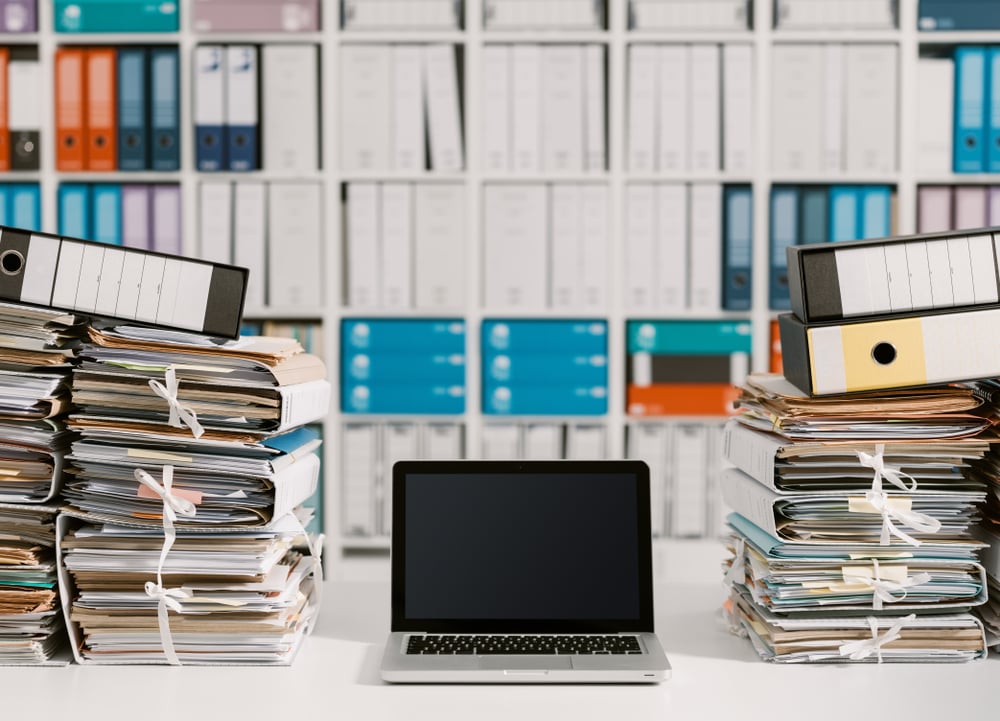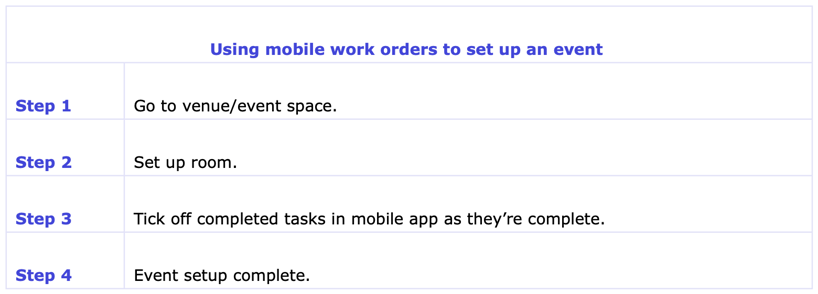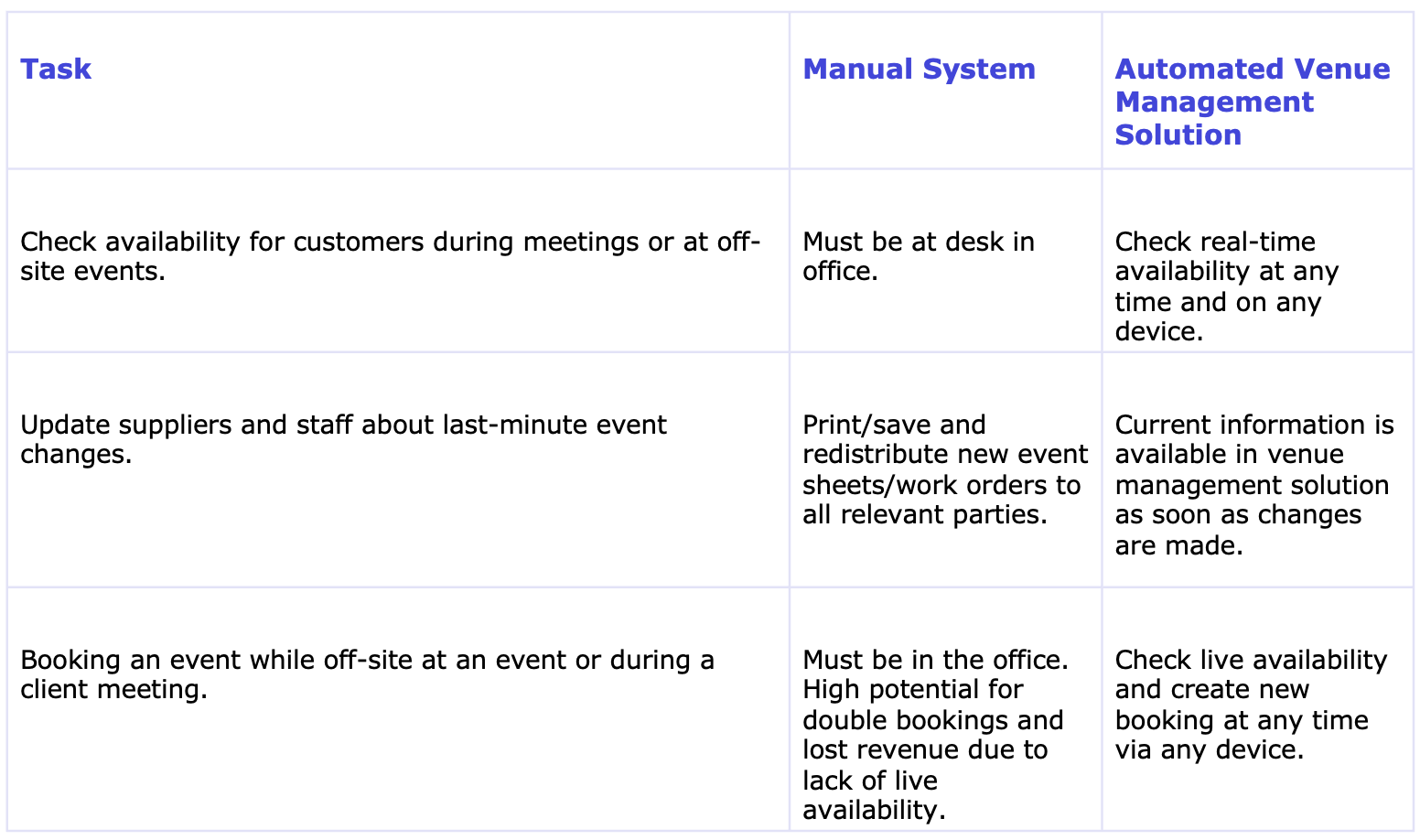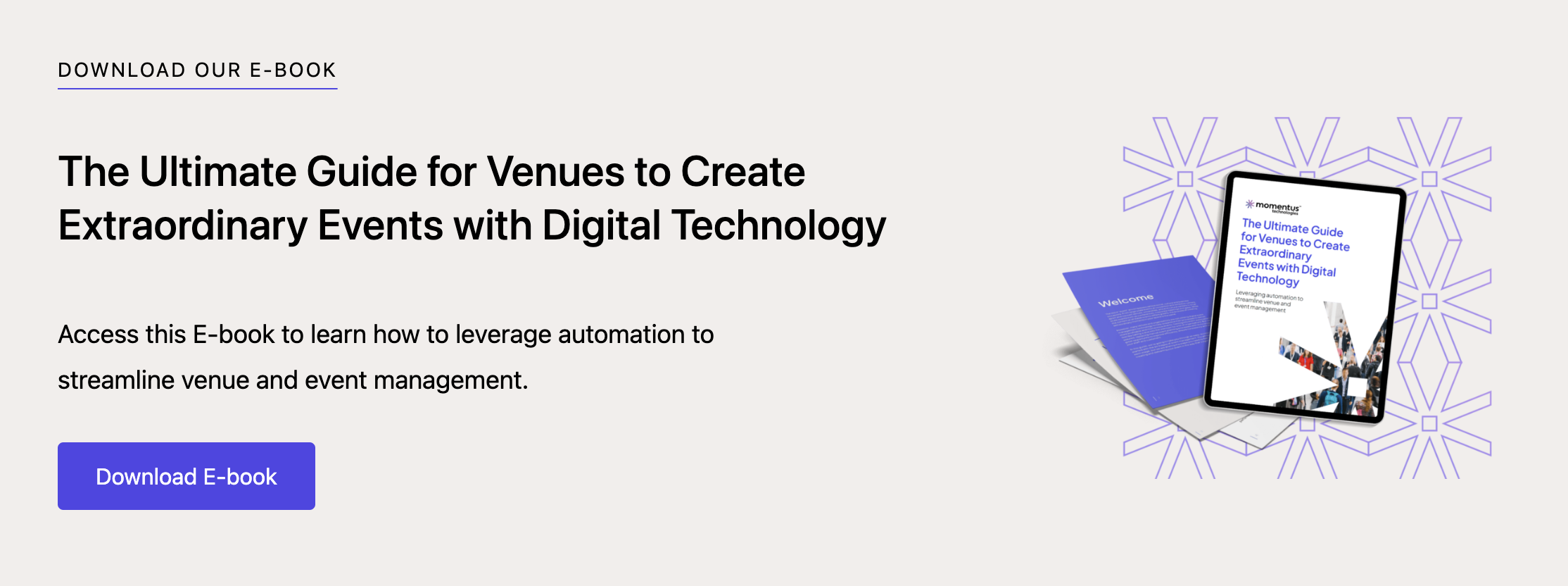Life Without Venue Management Software

No matter how big or small the venue, venue management is a challenging role. From coordinating upcoming events to monitoring budgets and revenue targets, delighting customers and managing multiple staff, suppliers and stakeholders — ensuring the smooth operation of an event venue is a huge responsibility with numerous moving parts and little room for error.
One of the biggest mistakes venues make is not having the right technology to support their busy teams. Instead of automating and streamlining their event operations, they rely on manual processes or disparate technologies that aren’t fit for purpose. This compromises efficiency and, ultimately, limits their true potential.
With more than 35 years of experience developing industry-leading venue management software, we've learned plenty about managing a successful event. We've also seen the benefits software can bring to venues and events organizations. Regardless of the industry, location, venue type, or event style, there are six stages of effective event management. Each of these stages is equally important and must be given the same degree of attention during the event management processes to ensure a successful outcome.
So, let’s explore the six stages of effective event management for venues and compare the impacts of manual processes versus automated technologies at each stage.
The six stages of effective event management for venues
-1.png?width=2430&height=1368&name=MicrosoftTeams-image%20(17)-1.png)
The number of new venue and event management challenges is always growing and shifting. Depending on your industry and region, you could have your own unique challenges as well. But there are still a number of common venue and event management challenges you can prepare for now.
Stage 1: Capture
From a venue perspective, every event booking starts with an initial inquiry. For venues that rely on manual processes, capturing the inquiry means physically recording the prospective event details before proceeding to check availability. This is followed by back-and-forth communication with the client to confirm their specific requirements and preferred date/time.
Below is an overview of the time savings venues can experience by leveraging automation to ensure all new inquiries are submitted online and flow directly into the venue management software ready for your team to action.

In addition to time savings, one of the biggest benefits of venue management software is that staff have access to real-time live venue availability. Real-time booking data not only prevents booking conflicts, but also helps venues and event organizers prioritize waitlists and improve venue occupancy.
Stage 2: Convert
To secure a booking, most venues send proposals or quotes to prospective clients outlining inclusions and pricing. The table below demonstrates the time savings venues can experience by automating the proposal process to help sales convert inquiries into confirmed bookings with ease.

Stage 3: Prepare
So many factors go into preparing for an upcoming event. Relying on manual processes leaves too much room for error when critical steps are missed. Utilizing venue management software ensures all staff follow the same standardized event management processes in the lead-up to an event, which improves the customer experience.
Below are some ways venues can save time and reduce error by automating key tasks during the event preparation process.

Stage 4: Deliver
Using automated venue management software streamlines communication, improves interdepartmental collaboration and ensures all users have access to the latest information, which leads to a better event experience for attendees. In the table below, we compare using manual processes versus automated mobile tools to support the first step in the event delivery process — setting up the venue.

While the above scenario is effective, it is inefficient and relies on multiple manual processes and printed work orders, which quickly become out of date due to last-minute changes. Below is an example of an efficient event setup workflow achieved using automated mobile tools that update in real-time.

Once the event setup is complete, there are plenty more steps that make up the event “delivery” where venue management software can support venues to provide better event experiences. Perhaps the most important of these automations are live updates and notifications for staff and suppliers about last-minute changes to event details and service times.
Stage 5: Report
It's essential to produce detailed reports to analyze the event's success. The table below highlights the dramatic time savings that can be achieved using venue management software to automate reports.

Stage 6: Nurture
According to HubSpot, the cost of acquiring a new customer is five to 25 times more than retaining an existing one. Below are some examples of the way that automated venue management software can help venues to provide better event experiences to encourage customers to book again.

Life with the best venue management software
In 2023, venues worldwide can no longer afford to rely on manual systems nor can they make do with workaround systems like Excel or disparate platforms that aren’t sophisticated enough to support their complex business needs.
Instead, they need a robust venue management platform to act as a single source of truth and consolidate their technology stack. They also need a platform that can be integrated with their other critical business applications like finance packages, marketing systems, HR platforms and email providers to improve data integrity and visibility across their businesses.
So, what does life with the best venue management software look like? Here are some of the key benefits venues have experienced automating their event management processes using Momentus:
- Automation helps venues do more with less, by giving staff tools to increase productivity and performance capacity.
- Empowering your team with the right technology fosters performance, engagement and job satisfaction. The goal of venue management software isn’t to replace the need for staff, rather it should support them to spend less time on laborious administrative duties and more time on revenue-generative activities and delivering exception event experiences.
- Eliminate costly manual processes like duplicating data entry to save time, increase efficiency and reduce the risk of human error.
- A single source of truth improves data integrity to encourage interdepartmental collaboration, streamline communications and ensure accurate reporting and better business insights.
- Enhance customer experiences with detailed CRM that allows you to access historical event data and client records in a few simple clicks, plus improve digital touchpoints using web forms and online booking portals.
Ready to automate event management processes? Our experts can help you find the right venue management software to support your venue’s long-term success.
Contact us today to discover how Momentus can help you streamline your workflows, increase efficiency and drive your venue into the future.

